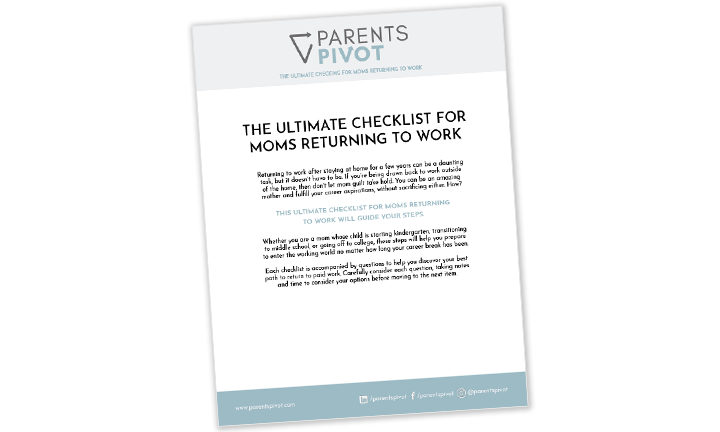Welcome back to Part 3 of my interview with Brenda James, former Managing Director at Clayton Services. Here’s a recap of what we have discussed so far in case you missed it:
Part 1: We learned about Debbie, Brenda’s star return-to-work hire, and what transferrable skills she brought from her experience as a stay at home mom to her experience as a recruiter. If you missed that, then you can check it out here.
Part 2: Last week she shared some of the challenges that stay at home parents face when they are returning to work. If you missed that, then you can check it out here.
Part 3: In this article, I will share some of the benefits that Brenda experienced in hiring a stay at home mom.
Part 4: Next week, we will discuss how employers can start to think about on boarding return to work candidates.
Sign up for our newsletter to make sure that you don’t miss more great articles like this. Let’s get started!
Anna: So that brings me to another question. What made you decide to hire Debbie over other people who had not taken a career break? What made her stand out?
Brenda: Well, all of those intangible things that I mentioned earlier. She had a lot of common sense and people skills. I enjoyed talking to her. She was funny. She was curious and insightful. She was smart. She was organized and a great problem solver.
And I think I'm a little unique in that, running a small company, I can’t always afford to hire someone with the skill set or experience that I needed at the beginning. I had to be very adept and open to training and developing people. This worked out very well for me because I could find people and develop them to our corporate culture and the way we do things. Certainly, I could find people that fit what I needed, came with experience, and didn’t have a gap in employment. Often, they came with their own set of problems and biases. I spent more time retraining because they had preconceived notions and skill sets that didn't work in our culture. It's funny that you said that Anna because I hired people that were re-entering the workforce so many times and I found that I had this sort of blank slate (Benefit 1). If I was hiring for the intangibles, the things that couldn't be taught, which I had identified in my company like intelligence level, willingness to learn, coachable team players, sense of humor, right people skills, common sense, and the ability to problem solve, then I hired an excellent employee.
The ability to interact with people was one of the things that wasn’t on a resume and was harder to teach (Benefit 2). I could teach people skills like how to get on LinkedIn and recruit people. All those intangible traits that I just listed are really hard to find. Did I have to teach Debbie how to recruit and how to find candidates? Absolutely and I did, and she taught me a lot.
As I told you earlier, she ended up teaching me new things, because she came with a very fresh perspective (Benefit 3) that she would not have had had she not taken a career pause to stay home with her children. She was very open to learning and sharing her insights. She would say “What about this?” So many times, her suggestions were incredibly insightful. It came from her background and experience and it was a very fresh approach to how I looked at things, or how we looked at things as a company. For that reason, I really believe in return to work programs.
Sometimes people will just keep going from job to job without taking time to reflect in between jobs and to evaluate why they left or what happened. When people return to work like Debbie, there is a fresh perspective where somebody else may have blinders on and didn’t see it. It could be staring the company right in the face. It takes someone coming in with a new set of eyes watching things instead of an industry insider who was so entrenched in the day to day.
Anna: Yes, I totally agree. I have seen this with my clients. When parents take a career pause and use the time to reflect, then they can really get connected to what they want professionally and be so eager to return (Benefit 4). They have that kind of energy that somebody who's been in the workforce consistently doesn't have. Like you say, that fresh perspective because they have been out doing different things gives them a unique vantage point to question and point out norms that may need to change. This can be so beneficial to the company’s hiring these return to work candidates.
Brenda: That's funny you said that because I spoke with a friend who owned her own business for years and she shut it down, retired, and then found herself needing to go back to work. She took a position that was a business development role. I always knew her to be an extremely confident person. She owned her own company was very successful. And when we spoke, I was very surprised, to hear that she was scared.
She said, “I find myself in a different role. I'm not calling the shots. I'm on this side of the table in a different level of sales than what my company did. I really feel the need to prove myself.”
At the beginning, she was just on fire. The people at her company were blown away by her work. It was funny when we spoke after she had been there a month, she said, “You know Brenda, I was so fearful. I wanted so much to prove myself that I really came in with this mindset that was so focused and laser about how good I wanted to be (Benefit 5). And then after a period of time, I started kind of relaxing because what was amazing to me was how complacent so many of the other team members were. I was trying so hard and I was working at 150% capacity, and when I looked at some of them they're working at like 80% capacity.” As a business owner, she just came in and brought the fire. That’s the kind of mindset that a lot of return to work candidates bring.
Thank-you Brenda for pointing out so many great reasons why return to work candidates can be excellent hires. What are some of the experiences hiring a stay at home parent returning to work? What stood out about those candidates? What did they bring to your company? Send us an e-mail or add in the comments below. We would love to hear from you!
We have one more part to share! Stay tuned for part 4 where we will discuss some ways that companies can start to think about on boarding return to work candidates. If you missed parts1 where we talked about the transferrable skills from parenting to paid work, then you can check it out here. If you missed parts 2, where we talked about challenges that stay at home parents face when returning to paid work, then you can check it out here.
To stay in the loop with great articles, events, and workshops to help parents return to their careers with strength and clarity, join our Parents Pivot newsletter here.
Wishing you all the best!
Anna
Parents Pivot works with parents returning to work to help them reconnect to their careers with strength and clarity. We offer coaching and support throughout the job search process whether it is figuring out what you want to do when you return to work, helping you with your resume and interviews, and coaching you through the on boarding process in your new career. We also help connect employers with highly talented stay at home moms and dads returning to work. Reach out to learn more about how we can serve you.


